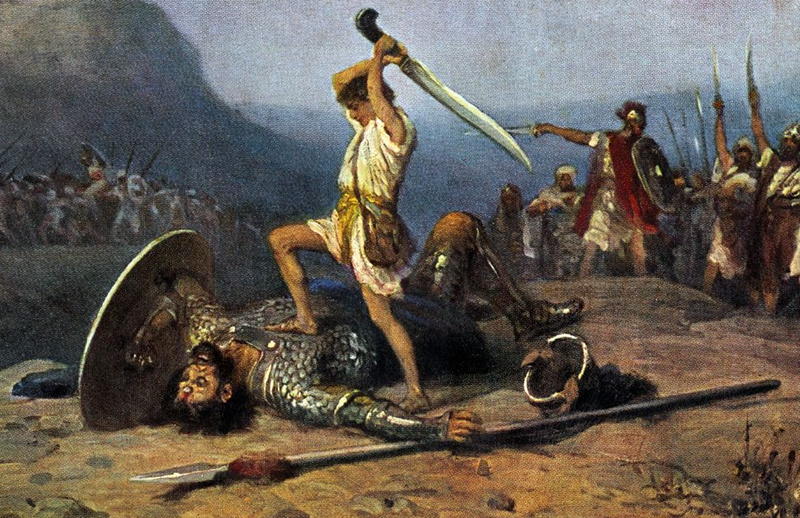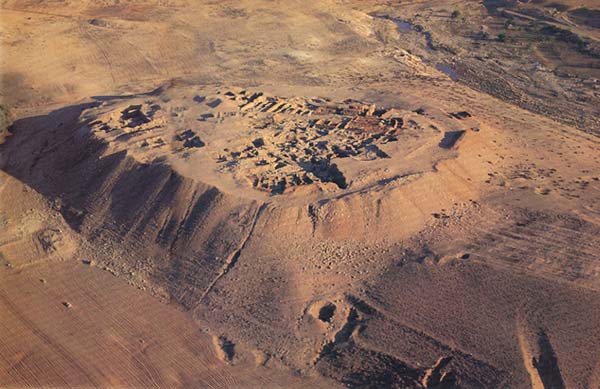 Returning from battle to their home in Ziklag, David, and his men found the city deserted and in ruins. Their enemy the Amalekites had taken captive all the women and children before burning Ziklag to the ground. “David and the people who were with him raised their voices and wept until they had no more strength to weep.” (1 Samuel 30:4 ESV) They had lost their wives, and their sons and daughters. Their future seemed dim, their great dream lost in the ashes.
Returning from battle to their home in Ziklag, David, and his men found the city deserted and in ruins. Their enemy the Amalekites had taken captive all the women and children before burning Ziklag to the ground. “David and the people who were with him raised their voices and wept until they had no more strength to weep.” (1 Samuel 30:4 ESV) They had lost their wives, and their sons and daughters. Their future seemed dim, their great dream lost in the ashes.
Israel’s future king realized he’d failed the men who had trusted and followed him across the desert into the land of their enemies. David’s men were disillusioned and in deep despair. Suffering an emotional meltdown, even David’s closest friends were “thinking of stoning him; each man grieved bitterly over his sons and daughters.” (1 Samuel 30:6 NET)
How many of us creators and dreamers can remember having a “Ziklag” moment, when it seems like all of one’s hopes and dreams have gone up in smoke — and that everything is lost? What does one do? The Bible states that, “David encouraged himself in the LORD his God.” (1 Samuel 30:6 AKJV)
Sounds good. But what exactly does this mean?
- Simply that David ran into the loving arms of the merciful God of
 Abraham, Isaac, and Israel — with whom the poet-warrior had developed a deep, personal relationship during the lonely days he’d spent in the fields tending his sheep. David did NOT flee from God in bitterness or blind hysterics, the way some people do when things go wrong. That’s what David was trying to explain, when he composed Psalm 23; the most beloved and well-known poem ever written; the Shepherd’s Psalm which continues to bring solace to new generations; a genuine source of encouragement for all creators and dreamers.
Abraham, Isaac, and Israel — with whom the poet-warrior had developed a deep, personal relationship during the lonely days he’d spent in the fields tending his sheep. David did NOT flee from God in bitterness or blind hysterics, the way some people do when things go wrong. That’s what David was trying to explain, when he composed Psalm 23; the most beloved and well-known poem ever written; the Shepherd’s Psalm which continues to bring solace to new generations; a genuine source of encouragement for all creators and dreamers.
- David also trusted God. He knew that Jehovah is faithful. Indeed, God had enabled David to slay the giant Goliath, to escape the murderous clutches of King Saul, and to survive — and even thrive — in the territory of his enemies, the Philistines.
So, when David faced his greatest challenge of all — his “Ziklag” — he reviewed his history with God, and knew his Lord would see him through. God would not abandon him nor forsake him. And David’s history lesson  is one we need to learn: God is willing and able to see each of us through our own personal “Ziklag”s; He will not abandon us in our time of need. (Psalm 94:14)
is one we need to learn: God is willing and able to see each of us through our own personal “Ziklag”s; He will not abandon us in our time of need. (Psalm 94:14)
To the contrary, God is always at the front line in every battle we face. And He’s already planning our victory celebration, which is why we can proclaim with David, “You prepare a feast for me in the presence of my enemies. …Surely your goodness and unfailing love will pursue me all the days of my life, and I will live in the house of the LORD forever.” (Psalm 23:5-6 NLT)
God called David “a man after My own heart.” Not because David was “perfect” or super-spiritual, and certainly not because he never made mistakes. No, David made plenty of mistakes, but according to God, “he will do everything I want him to do.” (Acts 13:22 NLT) And one of the main things God wants us to do, is to rely totally on Him.

That’s what faith is all about, “and without faith it is impossible to please God.” (Hebrews 11:6 NIV) David had unwavering faith in the face of overwhelming odds — which made him a “man after God’s own heart.” David’s faith also took him from the lowly position of shepherd to the highest office in the land.
David had discovered the keys to victory and success in this life and the life to come: whenever he “messed up,” whenever he was facing fearful obstacles and challenges, or suffered a crushing defeat — the “Ziklag”s of life — David immediately (1) consulted his Lord, by praying (talking) to God. And then? David simply (2) trusted his Lord to see him through.
Fellow dreamers and creators, when facing a “Ziklag” — a difficulty, a betrayal, a setback, a closed door, yet another rejection, or any major disappointment that leaves you feeling as though the bottom has dropped out beneath your world — cry out for help to your Heavenly Father. Do it immediately. Do it before you say or do anything else.
- Get God’s perspective on the situation.
- Seek God’s instruction on how to handle it.
- Then have faith that He will see you through.
 Actually, learn to do these things daily, as a matter of routine practice, no matter how great or small your problems seem. God cares about it all. Remember, relying on Him makes our Lord happy. (Refer back to Boot Camp sessions 5 through 7 — because these truths are vital to success in life and the pursuit of dreams.)
Actually, learn to do these things daily, as a matter of routine practice, no matter how great or small your problems seem. God cares about it all. Remember, relying on Him makes our Lord happy. (Refer back to Boot Camp sessions 5 through 7 — because these truths are vital to success in life and the pursuit of dreams.)
To “encourage oneself in the Lord” also means: Being willing to stand alone, without human help or encouragement. (Discussed in Boot Camp 14.5) Face it, sometimes the people closest to us, our immediate family, our best friends, even those who previously stuck by us through thick and thin (the way David’s “Mighty Men of Valor” had previously stuck by him) may abandon you when you encounter your “Ziklag”!
There’s truth to the old saying, “When the going gets tough, the tough get going” — often leaving us alone on life’s battlefields. In regards to our goals and dreams, disappointments, betrayals, and a general lack of support are all part of the territory. Sometimes, for a variety of reasons, people will refuse to help you. Sometimes they’re just too busy. Sometimes they get caught up in their own world. And sometimes, they actually want to be there for you, but they can’t, due to circumstances beyond their control (such as illness or a family obligation).

Still, whatever the reasons, there will be times when the people you were counting on the most, aren’t there for you; when you must face your problems alone; when there’s absolutely no one to support you except your Lord. You may cry out for help, but even your loved ones may fail to hear your cries, because they’re preoccupied; or, then again, they may simply turn a deaf ear to your needs.
It’s possible that these “silent” people won’t even have an encouraging word for you. Nothing. Nada. Zilch. Zero. Too bad.
Depressing? Yes, and that’s what can make a “Ziklag” so devastating. The good news is, our Heavenly Father always hears our cries. He’s never too busy for us, and He promises, “I will never fail you. I will never abandon you.” (Hebrews 13:5 NLT)
 Facing a tough situation? Follow David’s example: Ask God for help, and make the same positive confession he made: “I _________ (insert your name) encourage myself in You, Lord; I find my strength in You, my God.” (1 Samuel 30:6) You’ll soon learn — for those times when your circumstances appear bleak, or when people let you down — that you can stand alone when you must (but always WITH God by your side). You’ll have victory over every “Ziklag” you encounter in life, along the road to fulfilling your dreams!
Facing a tough situation? Follow David’s example: Ask God for help, and make the same positive confession he made: “I _________ (insert your name) encourage myself in You, Lord; I find my strength in You, my God.” (1 Samuel 30:6) You’ll soon learn — for those times when your circumstances appear bleak, or when people let you down — that you can stand alone when you must (but always WITH God by your side). You’ll have victory over every “Ziklag” you encounter in life, along the road to fulfilling your dreams!


 Close to a thousand years before the Lord Jesus Christ walked the earth in the form of a man, God anointed the Shepard David to be the King of His people Israel. But a big obstacle remained between David and the throne: a pain in David’s neck, whose name was Saul.
Close to a thousand years before the Lord Jesus Christ walked the earth in the form of a man, God anointed the Shepard David to be the King of His people Israel. But a big obstacle remained between David and the throne: a pain in David’s neck, whose name was Saul.



 Sooner or later we all face situations similar to what happened at Ziklag. Our “Ziklag”s may come in the form of demoralizing disappointments, setbacks, or false starts; unexpected obstacles, opposition, or challenges in life, particularly in the pursuit of our dreams. How do we endure our Ziklags? Well, what did David do?
Sooner or later we all face situations similar to what happened at Ziklag. Our “Ziklag”s may come in the form of demoralizing disappointments, setbacks, or false starts; unexpected obstacles, opposition, or challenges in life, particularly in the pursuit of our dreams. How do we endure our Ziklags? Well, what did David do?